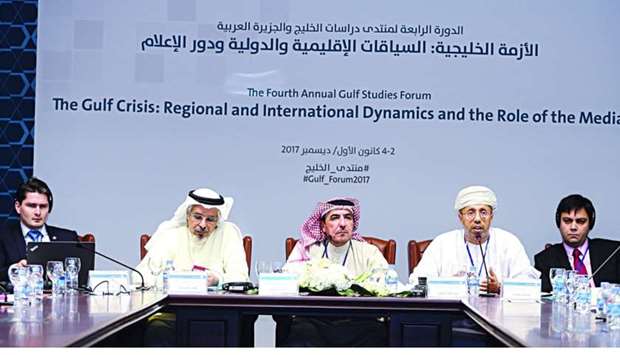‘It is not a real crisis. It is a fabricated one. It should be resolved immediately. If not, it will lead to more serious consequences. It will also lead to the involvement of many other external players in the issue. The Kuwaiti role in the mediation is to be highly appreciated and Oman supports the mediation efforts. We are all hopeful that the crisis will be solved at the GCC summit,’ said Abdullah Baabood, director, Gulf Studies Centre at Qatar University’s College of Arts and Sciences.
Some of the other panelists at “The Policies of the Gulf States towards the Crisis’ were also vocal about the need to solve the crisis at the earliest. The discussion was chaired by Suhaim al-Thani, a former researcher at the Arab Centre for Research and Policy Studies.
The other panelists included Dhafer al-Ajmi, executive director, Gulf Monitoring Group; Andreas Krieg, assistant professor at the Defence Studies Department of King’s College London; and Umer Karim, a researcher in Political Science and International Studies at the Department of Political Science and International Studies, University of Birmingham.
Baabood who spoke on ‘Oman’s Position on the Gulf Crisis, Drivers and Challenges’ noted that the present Gulf Crisis was an unprecedented one. “It is an unprecedented crisis that has gone very deep at all levels. It is a situation that has crossed all the normal situation. Oman always wants peace in the region and has called for dialogue to solve the differences,” he said.
“The conflict has deeply affected the social, political, cultural and economic aspects of the GCC. The credibility of GCC as a collective forum is questioned as it is not able to discuss the common issues and needs of the council. My reading of the Omani view is that GCC is very important and we need to go ahead with it as the GCC countries have to stand with and assist several other Arab countries that are facing problems, ” continued, Baabood.
The official highlighted that Qatar and Oman have very special and exceptional relations. “Presently, there is a greater level of co-operation between Qatar and Oman and there is several fold increase in the trade volume between the countries. There has been expansion and collaboration between both the countries in several areas. However, the benefits should come from cooperation not from crisis,” he added.
Al-Ajmi said that the Kuwaiti mediation has been working on a solution for the crisis right from the day it started. “Kuwaiti mediation has continued in several phases and is working behind the scenes. I am hopeful that the crisis will come to an end with the GCC summit. If the crisis is not solved, then the parties will have to resort other options such as approaching the international court and the tedious process that it involves,” said the expert.
“The conflict can be solved through secret discussions and meetings. Both parties trust Kuwait. Kuwaiti mediation has been accepted by several other international powers too. Kuwait is a soft power and it, I hope, will help to solve the crisis,” explained al-Ajmi.
Other panelists highlighted the social and political developments among the Gulf states and other countries in the region and how they are all interconnected in the emergence of the present situation.

The panelists during the discussion 'The Policies of the Gulf States towards the Crisis.' PICTURE: Jayan Orma
The Gulf Crisis might be resolved at the GCC summit, taking place in Kuwait from Tuesday, hoped some speakers at a panel discussion on the last day of the Gulf Studies Forum 2017 on Monday.

